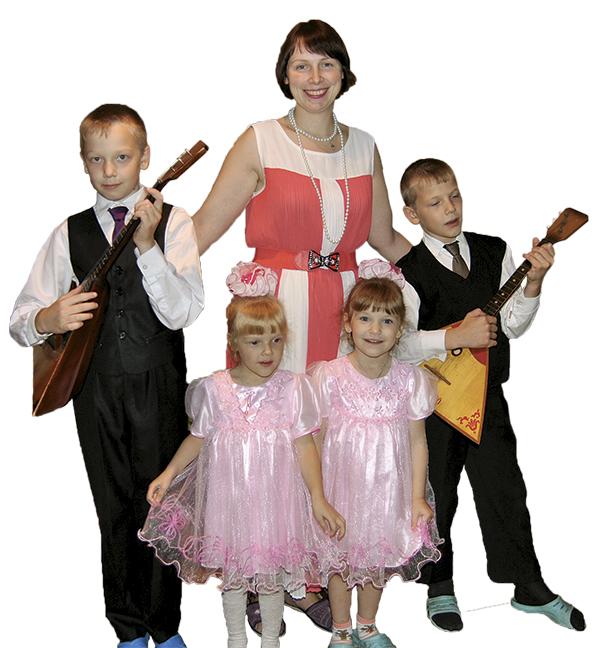
A story familiar to us is that, on the day before being born, a child asked God why he was coming into the world and what he should do. God replied, “I’ll present you with an angel to always accompany you, and explain everything, teaching all that is needed and protecting against evil. “What will be her name?” the child asked, to which God answered, “You’ll call her Mother.”
Maria and Oleg Braim believe that their children, Yan, Andrey, Miraslava and Galina, were sent by Fate. Married for 11 years, they are very content, despite small problems, as we all endure from time to time. Life is so busy that there’s no time for silly arguments. Evenings are filled with helping the children complete homework: their sons’ mathematics and drawing with the twin sisters. Maria notes, “A woman is happy when her children are healthy and when her husband loves her and takes care of the family.”
Maria and Oleg married without too much planning, in the early days of 2004; just two years later, on December 25th, Yan was born. Maria tells us, “He’s an active boy, now studying in the fifth grade, and attending a musical school, where he plays the balalaika. A year later, their second son, Andrey, joined the family. He spends so much time building satellites and towns they rather wonder if he’ll become an engineer. He has also won the school Olympiad in mathematics.
“Andrey is thoughtful, quite serious, and sensitive, playing the piano,” says his mother. Twins Galina and Miroslava were much anticipated, especially by grandmother Nina, Oleg’s mother. Having raised three sons, she had always dreamt of a daughter. “She was so happy that she purchased half a shop’s worth of ribbons and bows,” Maria recollects. “She spoils them endlessly with new dresses!”
Each child in the family has his or her own personality. During our conversation, they come to their mother repeatedly: Andrey to boast of earning two high marks at school; Yan to offer to play the balalaika; and the girls to show off their dresses.
“We try to pay attention to all that our children want to say,” says Maria. “A child’s soul grows when they know that they are heard and praised, and accepted as they are, rather than being suppressed by ‘parental authority’,” she explains. As a pre-school teacher and a children’s psychologist, Maria has some expertise. She’s always felt that her life should be connected with children.
“I have an affinity with children,” Maria smiles. “If a child is crying on the bus, I approach to chat and try to calm him or her. When we go out with our daughters, we always gather a crowd of children.” She’s often asked how she copes with four children but replies that, although it’s hard (sometimes with little time to think about the details) her husband helps out, completing homework with his sons and playing with his daughters. Yan and Andrey help in the kitchen while the girls copy, sweeping and dusting.
Maria and Oleg try to tackle work at home independently but never refuse help from the grandmothers, who call each evening to see how their grandchildren are doing. The couple have never asked for a nurse’s help either, preferring to do everything themselves. Of course, they receive family allowance, with the state providing children’s meals until they are aged 2 years, and an allowance until they are 3, with a 50 percent discount on kindergarten services, free school dinners and financial assistance for purchase of stationery (as the family is ‘large’). They have a three-roomed flat, in a new district of Minsk, which they built with a loan on privileged terms, as is given to such families.
Maria is only disappointed that her husband often needs to travel. “It’s just the way it is,” she sighs. “He needs to earn money to support this large family. He’s a constructor, and worked on building Chizhovka-Arena, so is often invited out to the regions.”
Maria also works, as a kindergarten teacher. “Just imagine: I have four children at home and 30 at work! I cannot be indifferent to children, letting each into my heart.” Parents feel this and are always grateful to Maria, who tries to find a common language with each child, through smiles, fairy tales and care. “We have a tradition in our family: we always say good morning. On kissing each son in the morning, I feel my heart growing warmer. This is how we are trying to live: with love and care,” she adds.
MT REFERENCE:
Since early 2015, the Family Capital long-term programme has been in operation, giving families $10,000 on the birth (or adoption) of a third and subsequent children; the money is for use in improving living conditions, to pay for education, medical or social services, or to contribute to a pension for the mother.
By Yekaterina Medvedskaya











